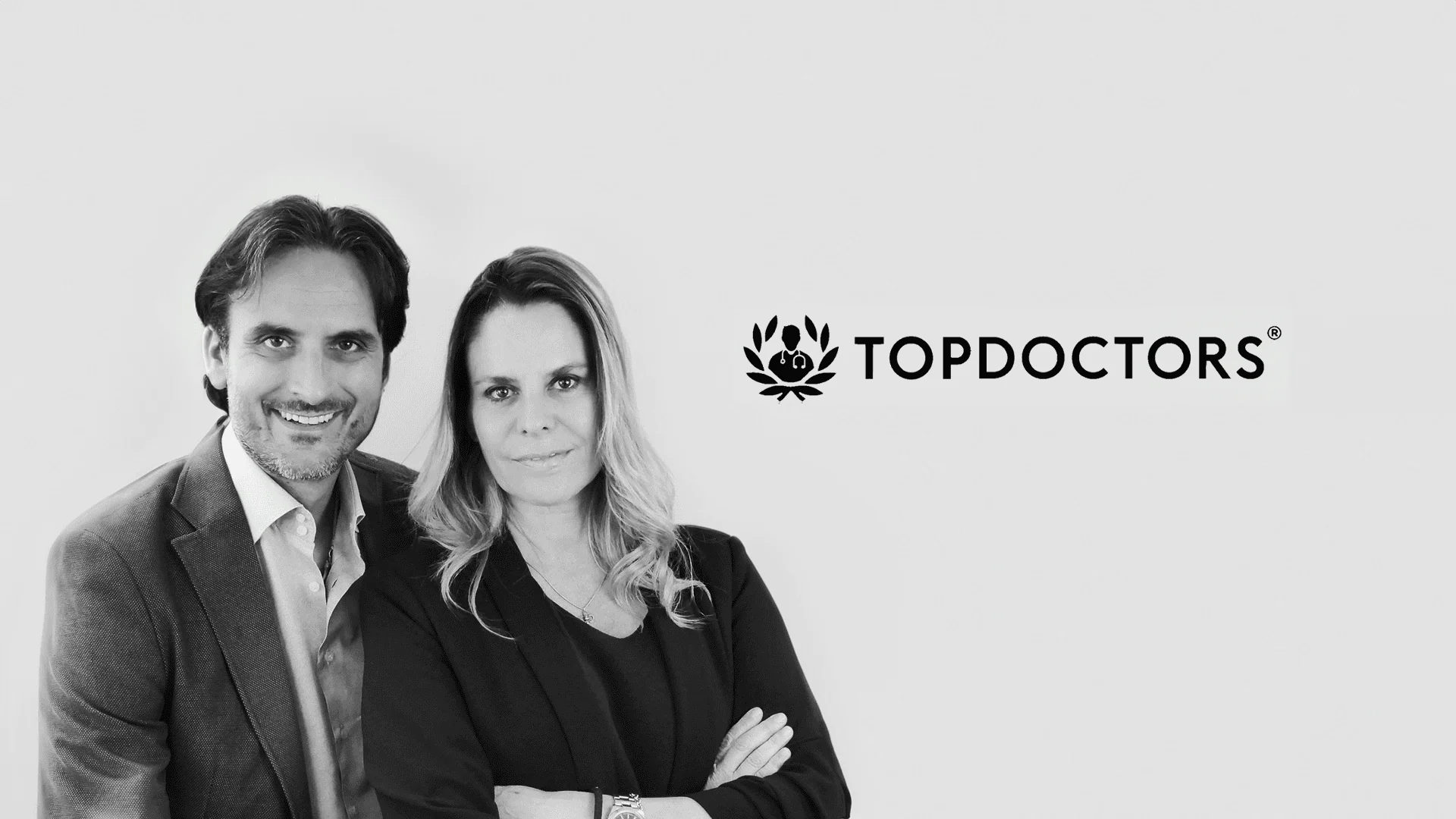“We form a team in our professional life and our private life.”
We are equal partners in our professional and personal lives, but we have very different upbringings. Lorena is Spanish and comes from a family of surgeons, and so she grew up in the medical field, whereas I am Italian, and it was my professional background that brought me into the pharmaceutical industry. Throughout my career, I have noticed that European health systems do not work in conjunction with one another. Some countries have extensive social coverage, while others depend on private mutual insurance companies, which monitor specialists and their patients.
“We realized that in Spain, as in many European countries, it was very difficult for patients to find the right specialist independently and that it was difficult for doctors to have their expertise recognized by new patients.”
Alberto and Lorena Porciani
In addition to low economic capital, the most precarious populations suffer the double impact of having low social capital—that is to say, their family, friends, and professional networks do not allow them to find the medical care they need.
At first, we didn’t have any investors, so we had to make do.
We approached specialist doctors and offered them the opportunity to subscribe to our service for 1,000 euros per year.
The project was launched thanks to the first forty-five doctors who trusted us.
Another problem arose—the Top Doctors name was already taken by an American company. We contacted them, and they also granted us our first investment of 500,000 euros! They also allowed us to use the brand name before we took full ownership of it. And lastly, we found our business model. Today, after an internal audit based on multiple criteria, we reference the best doctors based on their area of practice, seniority, and scientific expertise. Doctors must pay a subscription to gain full access to the technological services offered by our platform. The service from the patient’s point of view is free; we only charge the doctors. This enables patients, a majority of whom are not covered by mutual insurance, to still be given access to finding the best specialist depending on their needs and location.
It takes almost three consultations before finding the right specialist.
European health systems are very disparate when it comes to access to care. After speaking with Lorena’s family, we learned that doctors were often unfamiliar with digital technology and that the recommendation of a good doctor was still very much done through word of mouth.
What solution is there for those who are low on economic and social capital?
What can be done for those who do not have access to the specialist doctors they need or for those who need several consultations before finding the right one? We launched Top Doctors in Spain in 2008 in response to this issue. Today, Top Doctors also offers a telemedical service, which allows patients in medical deserts to access the best specialists. Our doctor rating system allows patients to feel confident that they are putting their healthcare into the hands of a qualified professional.
Top Doctors has a dual impact.
The first impact is the number of patients without health insurance who use the platform to find a doctor.
Today, there are more than 370,000 European patients without private mutual insurance on the platform, representing 62% of those registered.
That is our first impact objective. The second impact is just as important in our eyes: it is the number of appointments made by patients living in medical deserts. These patients often face geographical and social segregation, which makes access to quality secondary care difficult. To date, 40% of Top Doctors users live in medical deserts, and more than 50% consult doctors outside their region. Top Doctors thus allows for greater fairness in healthcare.
Our Europeanization plan received crucial support from Impact Partners.
Impact Partners invested in Top Doctors in 2021 and is focused on supporting us in our international development. They helped us recruit high-level talent, clarify our strategy by encouraging us to exit the Argentinian market, and to buy small competitors in Spain and England. With their support, we have been able to stay focused on areas of greatest impact, financially and socially.
In 2024, we estimate that eight hundred thousand appointments will be made by patients without health insurance.
As the company grows, more patients consult doctors, which means an overall improvement in care.
In 2024, five hundred thousand appointments will be made by patients located in medical deserts.
It is extremely difficult to duplicate the same business model across different countries equally. The adaptation work is considerable and requires a lot of preparation up front. Countries where social security is well organized, such as France, are not Top Doctors’ priority targets. These countries already have a well-developed health system, with a well-defined care pathway, and rating doctors is not authorized there.
In other countries, we take on this role and try to promote equity for all in care.
Patients in countries that are targets for us are forced to go to hospital for care, which can result in treatments less suited to their needs. We must adapt our business model to each country, and it requires significant preparation work in advance.
We are active in Europe, and our solution is deployed in Spain, Italy, and Great Britain.
We are also very present in South America and dream of being able to bring our solution wherever it makes sense.


